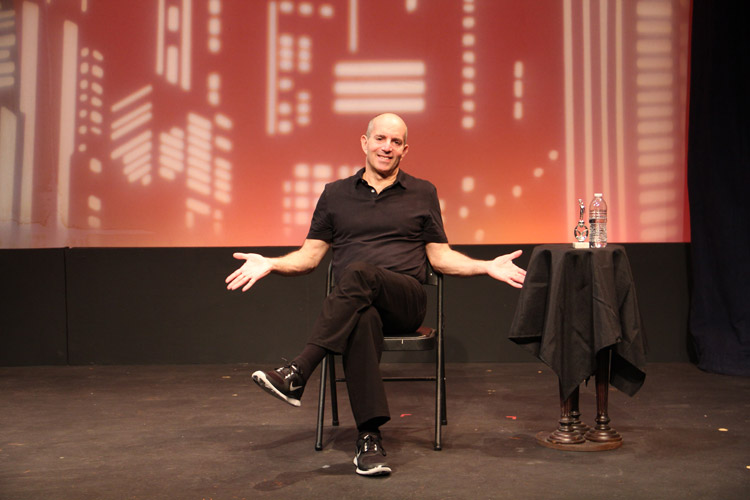 Brad Zimmerman stars In
“My Son The Waiter”
Brad Zimmerman stars In
“My Son The Waiter” Comedian and actor Brad Zimmerman’s focus during the autobiographical one-man show, “My Son The Waiter: A Jewish Tragedy,” is his struggle to become a successful actor while maintaining a relationship with his mother, who wants a more conventional, predictable life for her son.
During the 80-minute hybrid of theater and stand-up comedy, the performer relates his experience of spending 29 years working as a waiter while making half-hearted attempts to pursue his dream. He has encouraging moments, including working as an opening act for comedy stars Joan Rivers, George Carlin and Brad Garrett, and he takes stand-up comedy classes that sharpen his onstage abilities, but he never becomes a household name. By the end of the show, he acknowledges the possibility he may never become famous, but he is more at peace with the possibility than he was when he was younger.
The very-human story will resonate with anybody who dreams of a career in the arts but also feels pressure to make his or her parents happy.
In a black tucked-in T-shirt, faded gray jeans and sneakers, the bald, middle-aged Zimmerman began the show at the Colony Theatre in Burbank on April 28 shortly after 8 p.m. The theater was about two-thirds full. Zimmerman kicked off the evening by telling famous Jewish jokes from the Cat Skills era. Throughout the night he peppered in these quips.
The stage was bare, except for a small table, a flower, vase and a chair. This was an apparent reference to Zimmerman’s nearly three decades of serving food in a casual restaurant. Zimmerman, for his part, said working in a casual restaurant suited him. He was never interested in working in an upscale place that required an extensive knowledge of wines. He does a funny bit about wine tasting, during which he mocks the elaborateness of swooshing the liquid inside one’s mouth. He cannot abide the array of silly adjectives people use to describe how wine tastes.
“What would pair well with this?” he says. “How about a gun?”
The cranky, honest and authentic vibe becomes Zimmerman. Describing his lackluster love life, he explains that his single-minded focus toward a career in show business has affected his dating prospects. He reminisces about his first love, recalls the trouble he had unfastening her bra. Although together for seven months, the two never slept together.
“I didn’t know how,” he admits.
His relationship with his parents provides for the most aching moments. His nagging, well-meaning mother’s suggestion he work for his father in the furniture business, where he will have the opportunity to make money, hardens his will to chart his own course. Oh, well, she just wants her son to be happy. His father, whose happiest moments were rooting for his star athlete son, calls and says how proud of him he is. He asks Zimmerman if he needs any money.
When Zimmerman’s father dies, Zimmerman becomes more motivated and serious about his dream to become an actor.
I attended the show, appropriately enough, with my mother. Many times throughout the night I glanced over to see if she was enjoying it. For most of the evening she was smiling.
Indeed, it cannot be easy for one man to perform alone onstage for over an hour, with no props, slides or music; it was just Zimmerman, the lights and the audience. He held the audience’s attention, portraying several people from his life and poking fun at an audience whose laughter was loud at several moments and was more subdued during others.
Zimmerman makes the story of his life accessible, relatable. Portraying himself—and everyone else with a dream and a Jewish mother—Zimmerman led me to believe his life has been more comedy than tragedy.
“My Son the Waiter” continues at the Colony Theatre until June 10.
For additional information about the show, visit mysonthewaiter.com.























 More news and opinions than at a Shabbat dinner, right in your inbox.
More news and opinions than at a Shabbat dinner, right in your inbox.